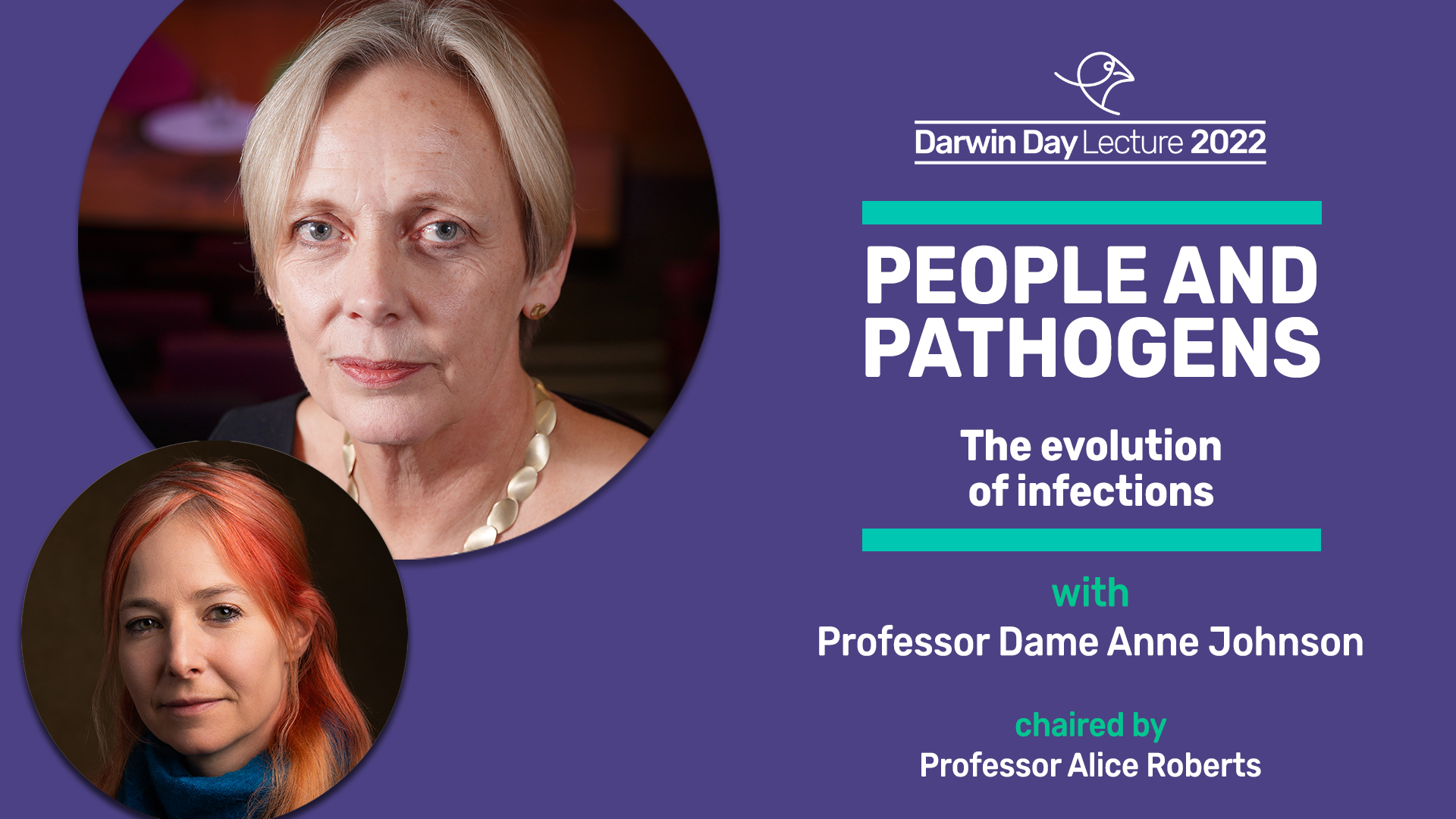
Professor Dame Anne Johnson photo credit: Academy of Medical Sciences/Big T Images
Professor Alice Roberts photo credit: David Stevens
Friday 11 February 2022
19:30–21:00
Online
OR
Conway Hall
25 Red Lion Square, London
People and pathogens: the evolution of infections
In December 2019, the World Health Organisation was informed of a concerning cluster of 44 cases of pneumonia of unknown cause. The two years since have provided a deadly lesson in how novel pathogens can spread quickly through an unprepared human population. We’ve also seen how different behavioural approaches – whether ‘living with the virus’ or ‘locking down’ – can affect the success of these pathogens in a particular place, at a particular time, helping or hindering its spread. And since early 2020, humanity has entered an unfortunate natural experiment, in which many in the ‘global north’ have used vaccination to erect a ‘wall of immunity’ to protect themselves, while natural infection is frequently the (inadequate) sole defence available to billions of people in low-income countries.
But while SARS-CoV-2 is novel, it is not unique. History doesn’t repeat itself, but it often rhymes. The initial HIV outbreak first identified in the 1980s saw untold numbers of deaths, and whole communities stigmatised, amid numerous failures of public health messaging around the virus and its spread, and the failure to deliver effective treatment at scale. The world is still living with the fallout of these failures, and the stigma, today.
When humans face novel pathogens, what happens next depends on getting a combination of interventions right, often in the face of initially incomplete scientific understanding. There is seldom one ‘magic bullet’. Scientific advances in medicine are just one way we must act to control and prevent outbreaks. The rest of the story? That comes down to people and the socioeconomic and physical environments in which they live, and the organised effort of society to intervene. Highly infectious microbes can flourish in exactly the social environments where people naturally cluster and mix together. They thrive in cities, through rapid travel, and often emerge through mixing between animal and human populations. In devising public health interventions, a humane and effective response has to consider people and their wider environment, develop clear and appropriate messaging and practical support, and always remember the humanity of those affected. What lessons, then, can we learn from the past?
In the 2022 Darwin Day Lecture, Professor Dame Anne Johnson will draw on her work carried out over decades, on HIV and STIs, influenza, and our current pandemic. Dame Anne will show how infections can emerge and thrive in circumstances which depend on the biology of the infection and the biology of the human host, interacting with human behaviours and environments. It is here that the struggle between people and pathogens is played out. And she will consider and evaluate the behavioural and biological interventions at our disposal – the tools with which science has stocked our arsenal – in the ongoing story of people and pathogens.
About Professor Dame Anne Johnson
Professor Dame Anne Johnson is Professor of Infectious Disease Epidemiology and Co-Director of Health of the Public, at University College London (UCL). She has led a distinguished career in epidemiology and public health, focusing on topics including HIV/AIDS, sexually transmitted infections, influenza, and diagnostics for infectious diseases.
She joined Middlesex Hospital Medical School at the start of the 1980s HIV epidemic, subsequently directing the Medical Research Council UK Centre for coordinating epidemiological studies of HIV/AIDS. In 1990 she was funded to complete the UK’s first National Survey of Sexual Attitudes and Lifestyles by the Wellcome Trust, work that has since been repeated every 10 years and continues to inform key policy on sexual health around the world.
She is a member of the Royal Society’s Data Evaluation and Learning for Viral Epidemics (DELVE) group, a member of the SAGE transmission subgroup, and Chair of the UK Committee for Strategic Coordination of Health of the Public Research (SCHOPR). She became President of the Academy of Medical Sciences in December 2020.
About Professor Alice Roberts
Professor Alice Roberts has been President of Humanists UK since January 2019. She is Professor of Public Engagement in Science at the University of Birmingham, Director of Anatomy for the NHS Severn Deanery School of Surgery, and holds honorary fellowships at Hull, York Medical School, and the University of Bristol.
She is an honorary fellow of the British Science Association, a member of the Advisory Board of the Cheltenham Festival of Science, Patron of the Association of Science and Discovery Centres, and a member of the Council of the British Heart Foundation.
She combines her academic career with one as a science presenter on television. She has appeared as a human bone specialist on Channel 4’s Time Team and in various projects on BBC2, including Coast, Don’t Die Young, The Incredible Human Journey, Wild Swimming, Digging for Britain, Horizon, and Origins of Us.
About the Darwin Day Lecture series
The Darwin Day Lecture explores humanism and humanist thought as related to science and evolution, Charles Darwin, or his works. The Darwin Day medallist has made a significant contribution in one of these fields.
The lecture and medal are named and held to mark the annual global celebration of the birth of Charles Darwin, held every 12 February.
Note: Live captions in English will be available to those with virtual tickets.
